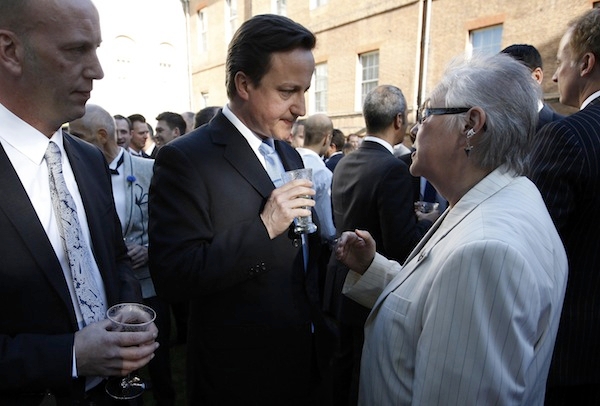Equal marriage has provoked anguished internal discussions in the Tory Party. Twenty Association Chairmen have asked the Prime Minister to backtrack on the proposals and up to 180 MPs are rumoured to be considering voting against the proposals today. But opponents of the Bill should rethink their position, given that our research and international evidence shows that gay marriage would be good for gay people and good for the institution of marriage, as well as being firmly based in conservative thinking.
The conservative tradition isn’t that of stern, unbending reaction that its critics often caricature it as. Instead, throughout history Conservatives have adapted to changed circumstances – in Disraeli’s words to ‘preserve all that is good… and remove all that is bad.’ Extending the beneficial institution of marriage to gay people would be firmly within that tradition – protecting and preserving the institution of marriage, whilst removing the inequity and unfairness that excludes gay people from the institution.
Equal marriage is about extending the benefits of marriage to a group presently excluded because of something over which they have no choice, it isn’t about ‘redefining’ the institution. As M V Lee Badgett suggested after a study of how equal marriage had worked in Holland, ‘all the evidence suggests that same-sex couples will fit right into our current understanding of marriage… Marriage itself will not be affected’.
Conservatives have always strongly believed in the social power of institutions and in the power of the family and marriage as an institution. Equal marriage would be firmly within that tradition. There’s a huge amount of evidence that marriage as an institution is good for individuals and society – married people are likely to be healthier, wealthier and happier than single people or cohabitees. They’re also more likely to remain faithful and stay together for longer as the social power of marriage means that it acts as a ‘commitment device’.
It’s entirely conservative to argue that the powerful benefits of marriage must be extended to gay people and that gay people in particular could benefit from the institution. Gay men are more likely to suffer mental health issues, drug and alcohol problems and rates of HIV have been on the rise amongst gay males in recent years. American psychologist, Alan Downs, coined the phrase ‘Velvet Rage’ to describe a feeling of alienation felt by gay men that leads to an increased incidence of mental health problems.
Nobody is arguing that equal marriage is a panacea that is going to solve these issues, or ongoing problems such as homophobic bullying in schools, the number of violent homophobic attacks or the lack of gay role models in football. But the social support and commitment device offered by marriage could help extend the health and stability benefits of marriage to gay people. This is surely something that conservatives who believe in the benefits of marriage should support. Equal marriage would also make quite clear that gay and lesbian people are absolutely equal members of society, help to build a bridge between gay people and their parents and, in doing so, reduce the sense of alienation felt by some young gay people.
There’s very little evidence that equal marriage had a damaging impact when it was introduced in ten other countries and considerable evidence that that it has delivered benefits. No country to have introduced equal marriage has turned its back on the measure. Electorates also seem to grow increasingly supportive of gay marriage when they have seen it work in practice. In Holland, for example, support for equal marriage now stands at some 82% and only 18% of Spanish voters want the law to be repealed. Divorce rates have fallen in some countries that have introduced the reform and risen in others – there is no evidence that equal marriage has had any notable impact either way.
People are right to be concerned about religious freedom. Whether the Church of England decides to hold or bless same sex marriage should be a decision for the Synod, not for Parliament or the courts. That is why it is right that safeguards are being put in place to ensure that there is no compulsion on religious institutions. It’s notable that the Law Society, amongst other distinguished lawyers, have argued that it’s extremely unlikely that an ECHR decision would force religious institutions to act against their will. And it would be wrong if it did. It would also be wrong, though, for religions, such as the Quakers, Unitarians and liberal Jews who want to marry gay people on their premises to be prevented from doing so.
Conservatives who worry about the impact of equal marriage on their electoral chances should study opinion polls more closely. Equal marriage is a popular concept amongst the general public and polls have shown that this support is stronger in areas such as the North and the Midlands than it is in London. Anthony Wells of You Gov has argued that ‘gay marriage will have a negligible impact on Tory support.’ If David Cameron were to U-turn on the issue, however, it could have a negative impact on the Tory image and help to retoxify the Tory brand, turning off just those voters that it needs to win in 2015.
Conservative MPs should think twice before voting against equal marriage. There is strong support for the measure in the country and international evidence suggests that the dire warnings of opponents are misplaced. Put simply, if MPs believe in the benefits of marriage then they should also support the extension of these benefits to a group presently excluded from them. Supporting equal marriage would be firmly in line with the best elements of the conservative tradition.
David Skelton is Deputy Director of Policy Exchange.





Comments